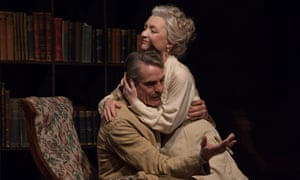Long Day's Journey Into Night review – Jeremy Irons and Lesley Manville shine with sexual passion and rage
Bristol Old VicRichard Eyre rushes through Eugene O’Neill’s masterpiece but gets to the heart of the tortured love of the Tyrones, played mesmerisingly by his leads
![[]](https://blogger.googleusercontent.com/img/proxy/AVvXsEhp7zwbwFcokdZ9-Qv5rxsicTZremr2AnlpKTShKm0AgPZHOP72WW7u2VVDJ4C0rsSxNPJWQRd0LwK3Y5QPfBpBTWZli2jsjaz4M36MGQK1UFL_jAdMVFL9gtaQ4hZYnZtwU-z0E8hq7Dl-xIXLTHQBAQs9ch_FFxH5n3AC4OVnc0YI2JvfdlzAbHs5DsFOn13Seq6BRzCEONOyU_ZwvUuHnigRmdkB1Q=s0-d-e1-ft)
Richard Eyre famously directed a 90-minute version of Ghosts at the Almeida. Ibsen’s play had a profound effect on Eugene O’Neill’s lengthy autobiographical masterpiece, which Eyre now steers home in three and a quarter hours. For my taste, this is too fast but there is no denying this is a distinguished event with a cast headed by Lesley Manville, who was Mrs Alving in Ghosts, and Jeremy Irons, returning to the theatre where he started to be part of its 250th anniversary.
But timing matters with O’Neill as much as it does in a Wagner opera. I suspect Eyre is seeking to contrast the brisk allegro of the play’s opening with the long adagio of its tragic end where the four members of the Tyrone family confront the appalling truth. But too often the tempo is unvaried, so that we miss the almost comic pattern of accusation and retraction that afflicts all the characters. When James Tyrone, a celebrated actor who sold out to commercial success, recites Shakespeare and his tubercular son Edmund recites Baudelaire, we should also feel them dwelling on the consolations of poetry rather than rushing through the speeches as they do here.
There are, however, many virtues to Eyre’s production. I’ve never felt so strongly before the sexual passion that Tyrone and his morphine-addicted wife, Mary, still feel for each other after 36 years. Manville is also outstanding as Mary. She mesmerisingly captures the violent mood-swings of the addict, switching in a second from girlish friskiness to mordant recrimination. She conveys Mary’s inner anxiety through a compulsive talkativeness and physical restlessness that leads her to be forever needlessly patting cushions. In Manville’s expert hands, O’Neill’s play becomes Mary’s tragedy: the story of a woman whose drug dependence was the result of her husband’s stinginess and who journeys into a past filled with religious faith and innocent hope.
Loss of faith affects all the characters: in the case of Tyrone, it is faith in his potential as a great Shakespearean actor. Irons has, of course, played Shakespeare but he remains unusual casting for the role. His forte is to suggest a refined asceticism whereas O’Neill’s character is a broad-shouldered, hard-drinking figure of Irish peasant stock. But, although cast against type and not always secure with the lines, Irons brings out strongly Tyrone’s tortured love for his wife: the moments I shall remember from his performance are those where he gazes at her with a sad-eyed mixture of guilt and longing.
The two Tyrone sons are also very good. Hadley Fraser has just the right blend of man-about-town ebullience and self-loathing as the worldly James Tyrone Jr and Billy Howle, a graduate of Bristol Old Vic theatre school, lends the consumptive Edmund a fitful romanticism and tainted hopelessness: it struck me the character is a direct parallel to Oswald in Ghosts. Jessica Regan also appears to telling effect as a caustic Irish maid who has the capacity for contradiction that blights her employers. It’s a great play filled with what the American critic Harold Clurman calls “the soulful poetry of despair and forgiveness”. And, although Eyre’s production often goes at too great a lick, it gets there in the end with the characters frozen in a deeply moving pietà in which Manville’s Mary takes on the quality of a wrecked madonna.
- At Bristol Old Vic until 23 April. Box Office: 0117 987 7877
................................................
![[]](https://blogger.googleusercontent.com/img/proxy/AVvXsEhp7zwbwFcokdZ9-Qv5rxsicTZremr2AnlpKTShKm0AgPZHOP72WW7u2VVDJ4C0rsSxNPJWQRd0LwK3Y5QPfBpBTWZli2jsjaz4M36MGQK1UFL_jAdMVFL9gtaQ4hZYnZtwU-z0E8hq7Dl-xIXLTHQBAQs9ch_FFxH5n3AC4OVnc0YI2JvfdlzAbHs5DsFOn13Seq6BRzCEONOyU_ZwvUuHnigRmdkB1Q=s0-d-e1-ft)










No comments:
Post a Comment